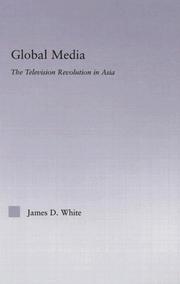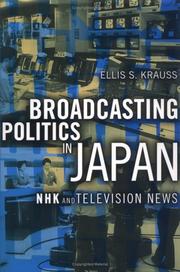| Listing 1 - 6 of 6 |
Sort by
|
Book
ISBN: 1003307752 1003307752 1000624633 1000624609 9781000624632 9781032310381 9781003307754 9781032310398 Year: 2022 Publisher: London Routledge
Abstract | Keywords | Export | Availability | Bookmark
 Loading...
Loading...Choose an application
- Reference Manager
- EndNote
- RefWorks (Direct export to RefWorks)
The BBC and NHK have dominated their national media systems since the 1920s and still play a central role in shaping political, social and cultural life. Both are highly trusted news organizations, and vitally influence national identity. Yet despite remarkably similar organizational and funding structures, they differ in their editorial autonomy, relationship to the state, and in the social and cultural roles they play. While the BBC, proud of its independence, acts as a watchdog on the powerful, NHK prefers a guide dog role cooperating with rather than confronting political elites. The BBC is also more willing to challenge prevailing social norms, often serving as an agent of social change. NHK prefers to avoid controversy, serving as an agent of social stability. The book argues that these differences were shaped by decades of conflict and cooperation between broadcasters, governments, commercial media, interest groups and audiences. The broadcasters adopted distinctive editorial strategies to retain public support and elite approval in the face of technological upheaval, hostility from commercial rivals, and continuous political interference. Both, however, continue to uphold the belief that democratic and social goals are better served by public rather than commercial media.
Public broadcasting --- History --- British Broadcasting Corporation. --- Nihon Hōsō Kyōkai.
Book
ISBN: 9781032310381 9781032310398 Year: 2023 Publisher: London Routledge
Abstract | Keywords | Export | Availability | Bookmark
 Loading...
Loading...Choose an application
- Reference Manager
- EndNote
- RefWorks (Direct export to RefWorks)
"This book explores the remarkably similar national public broadcasters of Britain and Japan - the BBC and NHK. It considers the origins of both organisations in the 1920s, highlights how they have both been major shapers of national life and national identity in their respective countries, how they have both been significant innovators of broadcasting technology, and how both have high reputations for honest and balanced news reporting. It outlines how both have adapted to cope with successive major changes in the broadcasting landscape. The book also points out the major differences: the BBC's greater success at being commercial and entrepreneurial, the BBC's fierce protection of its editorial independence, often used to play a watchdog role in holding the powerful to account - which contrasts sharply with the approach of NHK, which cooperates with rather than confronts political elites, serving as an agent of social stability, whereas the BBC acts more as an agent of social change. As debates about the future of public broadcasting become more intense, this book provides useful evidence of how public broadcasting can be approached in different ways"--
Public broadcasting --- Mass media --- History --- Political aspects --- Nihon Hōsō Kyōkai.
Periodical
ISSN: 05495105 Year: 1963 Publisher: [Tokyo] : Nihon Hōsō Kyōkai,
Abstract | Keywords | Export | Availability | Bookmark
 Loading...
Loading...Choose an application
- Reference Manager
- EndNote
- RefWorks (Direct export to RefWorks)
Television broadcasting --- Radio broadcasting --- Télédiffusion --- Radiodiffusion --- Periodicals --- Periodicals. --- Périodiques --- Périodiques --- Nihon Hōsō Kyōkai --- Periodicals.
Book
ISBN: 4431547282 4431540229 9786613798848 4431540237 1282056891 Year: 2012 Publisher: Tokyo : Springer,
Abstract | Keywords | Export | Availability | Bookmark
 Loading...
Loading...Choose an application
- Reference Manager
- EndNote
- RefWorks (Direct export to RefWorks)
This book focuses on the two psychological factors of naturalness and ease of viewing of three-dimensional high-definition television (3D HDTV) images. It has been said that distortions peculiar to stereoscopic images, such as the “puppet theater” effect or the “cardboard” effect, spoil the sense of presence. Whereas many earlier studies have focused on geometrical calculations about these distortions, this book instead describes the relationship between the naturalness of reproduced 3D HDTV images and the nonlinearity of depthwise reproduction. The ease of viewing of each scene is regarded as one of the causal factors of visual fatigue. Many of the earlier studies have been concerned with the accurate extraction of local parallax; however, this book describes the typical spatiotemporal distribution of parallax in 3D images. The purpose of the book is to examine the correlations between the psychological factors and amount of characteristics of parallax distribution in order to understand the characteristics of easy- and difficult-to-view images and then to seek to create a new 3D HDTV system that minimizes visual fatigue for the viewer. The book is an important resource for researchers who wish to investigate and better understand various psychological effects caused by stereoscopic images.
3-D images. --- Stereoacuity. --- Stereoscopic cameras. --- 3-D television --- High definition television --- Electrical & Computer Engineering --- Engineering & Applied Sciences --- Applied Physics --- Electrical Engineering --- Telecommunications --- 3-D television. --- High definition television. --- Nihon Hōsō Kyōkai. --- HDTV (Television) --- 3D television --- Stereoscopic television --- Television, Three-dimensional --- Three-dimensional television --- Nippon Hōsō Kyōkai. --- NHK Giken --- NHK Sōgō Gijutsu Kenkyūjo --- NHK Technical Research Laboratories --- Nihon Hōsō Kyōkai Sōgō Gijutsu Kenkyūjo --- N.H.K. Technical Research Laboratories --- N.H.K. Sōgō Gijutsu Kenkyūjo --- 日本放送協会. --- Engineering. --- Mathematics. --- Visualization. --- Signal, Image and Speech Processing. --- Optics, Lasers, Photonics, Optical Devices. --- Visualisation --- Imagery (Psychology) --- Imagination --- Visual perception --- Math --- Science --- Construction --- Industrial arts --- Technology --- Television --- Three-dimensional display systems --- Signal processing. --- Image processing. --- Speech processing systems. --- Lasers. --- Photonics. --- New optics --- Optics --- Light amplification by stimulated emission of radiation --- Masers, Optical --- Optical masers --- Light amplifiers --- Light sources --- Optoelectronic devices --- Nonlinear optics --- Optical parametric oscillators --- Computational linguistics --- Electronic systems --- Information theory --- Modulation theory --- Oral communication --- Speech --- Telecommunication --- Singing voice synthesizers --- Pictorial data processing --- Picture processing --- Processing, Image --- Imaging systems --- Optical data processing --- Processing, Signal --- Information measurement --- Signal theory (Telecommunication) --- Optics, Optoelectronics, Plasmonics and Optical Devices. --- Nihon Hoso Kyokai.

ISBN: 0203036115 1299458718 1136090827 9781136090820 9780203036112 9780203036112 0415973066 9780415973069 0415884047 9780415884044 9781136090981 1136090983 9781136090905 1136090908 9781299458710 Year: 2005 Publisher: New York Routledge
Abstract | Keywords | Export | Availability | Bookmark
 Loading...
Loading...Choose an application
- Reference Manager
- EndNote
- RefWorks (Direct export to RefWorks)
This book is about the processes of globalization, demonstrated through a comparative study of three television case histories in Asia. Also illustrated are different approaches to providing television services in the world: public service (NHK in Japan), state (CCTV in China) and commercial (STAR TV, based in Hong Kong). Through its focus, Global Media addresses a considerable lacuna in the media studies literature, which tends to have a heavy Western bias. It provides an original addition to the literature on globalization, which is often abstract and anecdotal, in additio
Television broadcasting --- Television broadcasting policy --- Television broadcasting and state --- Broadcasting policy --- Government policy --- Nihon Hōsō Kyōkai. --- Zhong yang dian shi tai (Beijing, China) --- Beijing dian shi tai (1958-1978) --- Chung yang tien shih tʻai (Beijing, China) --- 中央电视台 (Beijing, China) --- 中央電視台 (Beijing, China) --- 中央電視臺 (Beijing, China) --- Zhongguo zhong yang dian shi tai (Beijing, China) --- 中国中央电视台 (Beijing, China) --- 中國中央電視台 (Beijing, China) --- China Central Television Station --- CCTV --- Ōsaka Hōsōkyoku --- Tōkyō Hōsōkyoku --- Nagoya Hōsōkyoku --- Nippon Hōsō Kyōkai --- 日本放送協会 --- 日本放送協會 --- NHK --- N.H.K. --- Japan Broadcasting Corporation --- Broadcasting Corporation of Japan --- Japanese State Television --- Riben guang bo xie hui --- Jih-pen kuang po hsieh hui --- 日本广播协会 --- NHK Japan --- NHK of Japan

ISBN: 0801437482 9780801437489 1501731807 Year: 2000 Publisher: Ithaca Cornell university press
Abstract | Keywords | Export | Availability | Bookmark
 Loading...
Loading...Choose an application
- Reference Manager
- EndNote
- RefWorks (Direct export to RefWorks)
The aftermath of Japan's 1945 military defeat left its public institutions in a state of deep crisis; virtually every major source of state legitimacy was seriously damaged or wholly remade by the postwar occupation. Between 1960 and 1990, however, these institutions renewed their strength, taking on legitimacy that erased virtually all traces of their postwar instability.How did this transformation come about? This is the question Ellis S. Krauss ponders in Broadcasting Politics in Japan; his answer focuses on the role played by the Japanese mass media and in particular by Japan's national broadcaster, NHK. Since the 1960s, television has been a fixture of the Japanese household, and NHK's TV news has until very recently been the dominant, and most trusted, source of political information for the Japanese citizen. NHK's news style is distinctive among the broadcasting systems of industrialized countries; it emphasizes facts over interpretation and gives unusual priority to coverage of the national bureaucracy. Krauss argues that this approach is not simply a reflection of Japanese culture, but a result of the organization and processes of NHK and their relationship with the state. These factors had profound consequences for the state's postwar re-legitimization, while the commercial networks' recent challenge to NHK has helped engender the wave of cynicism currently faced by the state. Krauss guides the reader through the complex interactions among politics, media organizations, and Japanese journalism to demonstrate how NHK television news became a shaper of Japan's political world, rather than simply a lens through which to view it.
Television broadcasting of news --- Government and the press --- History --- Nihon Hoso Kyokai --- J4126 --- J0969 --- J0961 --- J6840 --- -Nihon Hōsō Kyōkai --- -Government and the press --- -Press --- Press and government --- Press policy --- State and the press --- Press --- Freedom of the press --- Press and politics --- Television broadcasting --- Television coverage of news --- Television journalism --- Television news --- Broadcast journalism --- Japan: Sociology and anthropology -- media and (mass) communications --- Japan: Journalism -- newspapers and news agencies --- Japan: Journalism -- policy, legislation, guidelines, codes of behavior --- Japan: Media arts and entertainment -- television --- Japan --- -History --- -Government policy --- News --- History. --- -Japan: Sociology and anthropology -- media and (mass) communications --- -J4126 --- -Television broadcasting --- -News --- Government policy --- Nihon Hōsō Kyōkai --- Nippon Hōsō Kyōkai --- 日本放送協会 --- 日本放送協會 --- NHK --- N.H.K. --- Japan Broadcasting Corporation --- Broadcasting Corporation of Japan --- Japanese State Television --- Riben guang bo xie hui --- Jih-pen kuang po hsieh hui --- 日本广播协会 --- NHK Japan --- NHK of Japan --- Ōsaka Hōsōkyoku --- Tōkyō Hōsōkyoku --- Nagoya Hōsōkyoku --- Television broadcasting of news - Japan - History --- Government and the press - Japan - History - 20th century --- Journalistes --- Presse et politique --- Télévision --- Etat et presse --- Japon --- 20e siècle --- Émissions de nouvelles
| Listing 1 - 6 of 6 |
Sort by
|

 Search
Search Feedback
Feedback About UniCat
About UniCat  Help
Help News
News